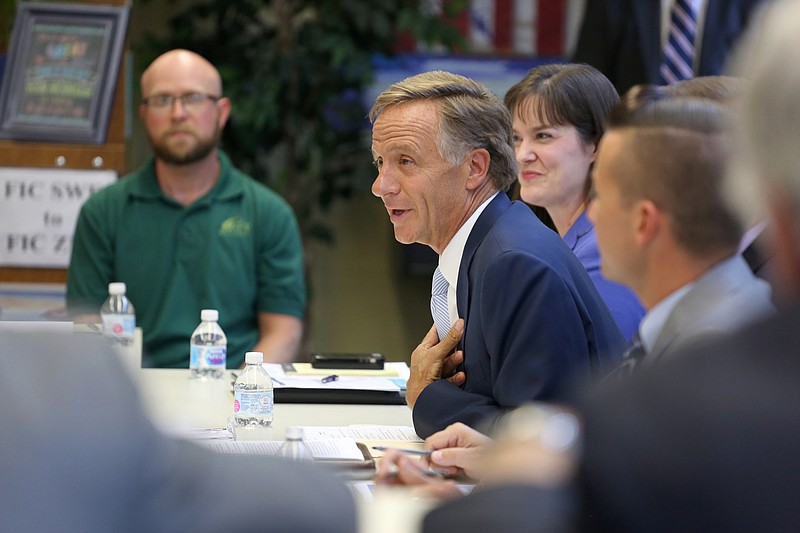NASHVILLE - Gov. Bill Haslam has unveiled changes in the delivery of the state's problem-plagued TNReady assessments for students this year while also announcing new steps to provide local school districts with "more affordable options" next year in obtaining technology required to take the exams.
At the same time, the lame-duck Republican governor on Wednesday defended the program and also urged both of his would-be successors - Democrat Karl Dean and Republican Bill Lee - and state lawmakers to stay the course in keeping the tests.
"It's obviously no secret we've had some challenges around TNReady as well as a whole lot of discussion about what the future should look like," said Haslam, who was joined by state Education Commissioner Candice McQueen, and Wayne Miller, former executive director of the Tennessee Organization of School Superintendents.
 Staff photo by Erin O. Smith / An attendee takes notes during a roundtable discussion at Soddy Daisy High School Tuesday, August 28, 2018. The event was held to give teachers, school technology and assessment coordinators, and school district administrators the opportunity to share recent challenges related to the online delivery of state assessments.
Staff photo by Erin O. Smith / An attendee takes notes during a roundtable discussion at Soddy Daisy High School Tuesday, August 28, 2018. The event was held to give teachers, school technology and assessment coordinators, and school district administrators the opportunity to share recent challenges related to the online delivery of state assessments.But, Haslam said, "we don't want to go back."
With Haslam's departure, key leadership over the department, such as McQueen, who Haslam appointed in December 2014, could change with a new governor.
The exams are used not just to assess students and provide teacher feedback, but are used as factors in local teacher pay and retention decisions and school performance. But this spring, the test system suffered a second setback with the state's latest vendor, which the state plans to replace in the 2019-2020 academic year.
Describing changes as "real solutions," with some of them already underway, Haslam, McQueen and Miller said the steps are a direct response to a report from educators after a statewide listening tour.
"Making continuous improvements based on educator feedback is what will make our testing program work for every teacher and student in Tennessee," McQueen said. "We are grateful to the teachers, testing coordinators and administrators that shared their ideas with us, and we feel confident that these steps we are announcing today will result in smoother test delivery and feedback that will support greater student success."
This week, the Department of Education said it conducted a successful verification of the testing platform with an estimated 50,000 students participating. Officials said they will be ensuring faster turnaround of results starting with this fall's end-of-course assessments and providing better educator training opportunities.
Educators also urged the state to "stay the course" in the 14-page report issued earlier this month, summarizing the feedback Haslam gleaned from about 150 educators that he met during those roundtables.
As part of the state's new request for proposal contract process to find a new vendor for next year, the state also wants any new testing company chosen to partner with Tennessee businesses and universities to create test materials and score tests.
Steps for the 2018-2019 school year include:
- Earlier access to test administration documents
- Clarity and consistency in the test administration documents
- Less paper to manage by combining materials
- Fewer assessment sub-parts
- A more "responsive" help desk
For the 2019-2020 school year, officials say they will provide:
» Greater access to technology by pursuing implementation of a Tennessee Student Technology Enrichment Program to help ease costs, especially for for poorer districts, in buying computers used by students to take the exams. Only about a third of school districts have a computer for each student.
» "Smarter delivery" of assessments based on grade levels. Grades 3-4 testing would remain paper only. Grades 5-8 would continue testing science online and other subjects will move online only after the vendor demonstrates readiness. High school end-of-course assessments will be administered online but officials will "explore" offering reading passages via paper copies.
» Faster results will be delivered to both teachers and families, with priority given to an assessment vendor capable of providing electronic delivery through creation of online logins once scores are available. Slow feedback has been a major complaint.
» Better preparations will be made available by providing additional TNReady practice test items to teachers and students. Moreover, another option would let districts deliver optional benchmarks tests that mirror TNReady.
Haslam and McQueen conducted a statewide listening tour this fall, including a stop at Soddy-Daisy High School in Hamilton County, where they heard from educators about their experiences with TNReady, especially during the spring's fiascoes.
Chattanooga area educators voiced overall frustrations at the time.
"We felt like the whole situation was on fire," said Michael Kahrs, director of student information systems for Cleveland City Schools.
Many of the frustrations educators shared included communication with the state and the school districts, as well as the difficulty of communicating changes or problems between individual schools within districts and the step back to widespread paper testing next year.
This school year, high school exams will remain online, but students will be provided some paper passages for reading tests and grades K-8 will be paper and pencil tests, despite some calling for statewide paper and pencil tests earlier this year.
Meanwhile, both major party gubernatorial nominees Lee and Dean have voiced concerns over problems with TNReady school testing programs.
"You might change the name because it hasn't been ready," Dean recently observed, adding that teachers, students and parents don't trust the program because of two years of problems. Moreover, he said, "what you don't want is an atmosphere or a culture where everyone thinks that you have to test and test and test."
Calling the situation "obviously a challenge," Lee recently said "TNReady hasn't worked" and the current vendor, Questar, must go, a decision already made by Haslam, with the state now engaging in a new contracting process that will be completed after he leaves office.
Lee has also said he would take a look at the "entire measurement system in state" and wants a "reset."
Haslam, who is backing Lee, said a "reset" is "what's happening now" as the state prepares to issue a new request for proposals, through which bidders tout their qualifications and agree to state requirements.
The governor said "what I hope the next governor understands is the connection of all this" in areas including the state's free, lottery-funded community and technical college scholarships to recent high school graduates and older ones who had some college.
Tennessee, Haslam said, has come a long way in raising its K-12 education standards and creating its own regimen of testing.
"Now, we just got to get to where the delivery of that assessment works," he said. "So maybe that's why it's been so frustrating to me." Haslam noted his free, lottery-funded community and technical college scholarship programs ultimately are dependent on a quality K-12 education.
Noting how he has tied student and school outcomes as a factor in teacher evaluations, impacting pay and job security, Haslam said "that's politically not real popular." But he said, but it's "critical" to success. The state has been recognized nationally for improving its standing on a national assessment, at one point becoming the fastest improving state in the country.
Asked if he were concerned that Lee or Dean would stand by the state's accountability provisions, Haslam said, "I don't know the answer to that. It's a politically difficult thing to do."
"It's a concern, I wouldn't say that in terms of just the next governor but the next legislature," Haslam acknowledged. "The next legislature can make a determination of that. But I would just encourage everybody to remember how we got here."
Contact Andy Sher at asher@timesfreepress.com or 615-255-0550. Follow him on Twitter @AndySher1.
Contact staff writer Meghan Mangrum at mmangrum@timesfreepress.com or 423-757-6592. Follow her on Twitter @memangrum.
